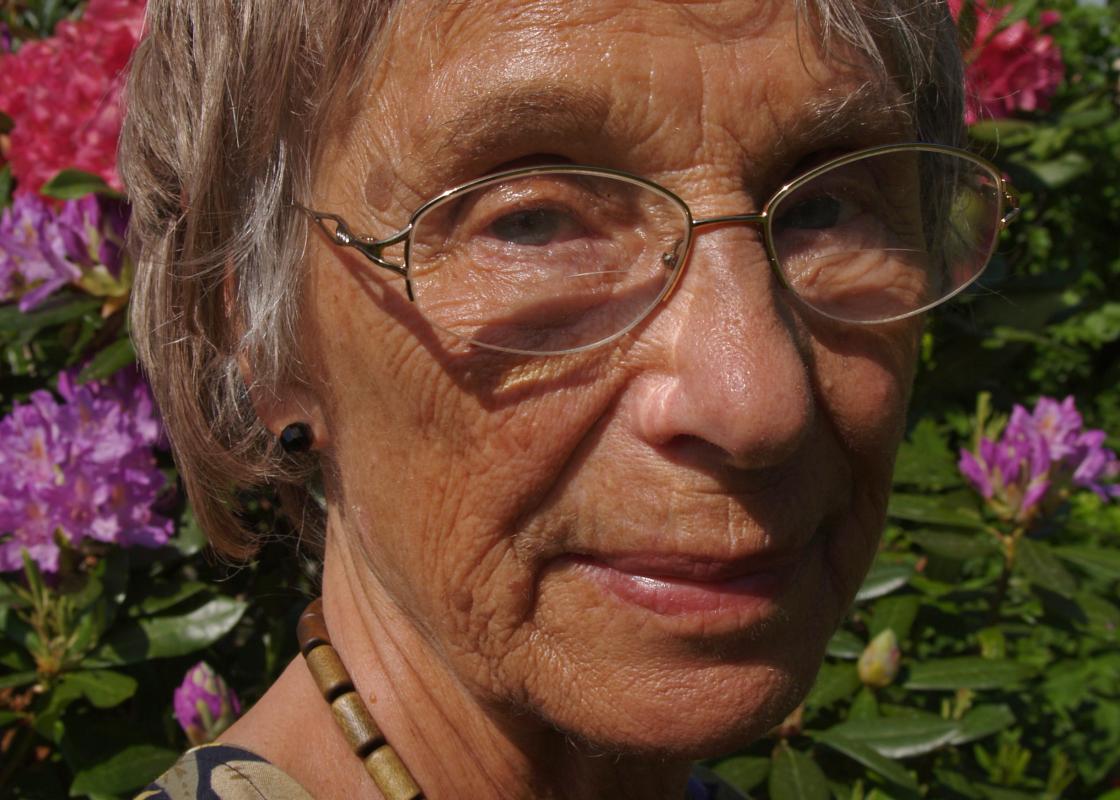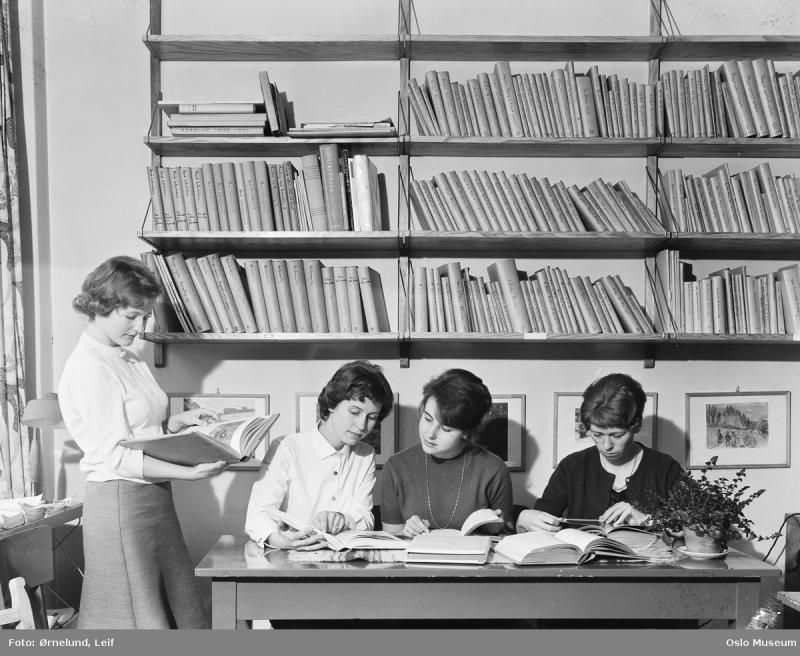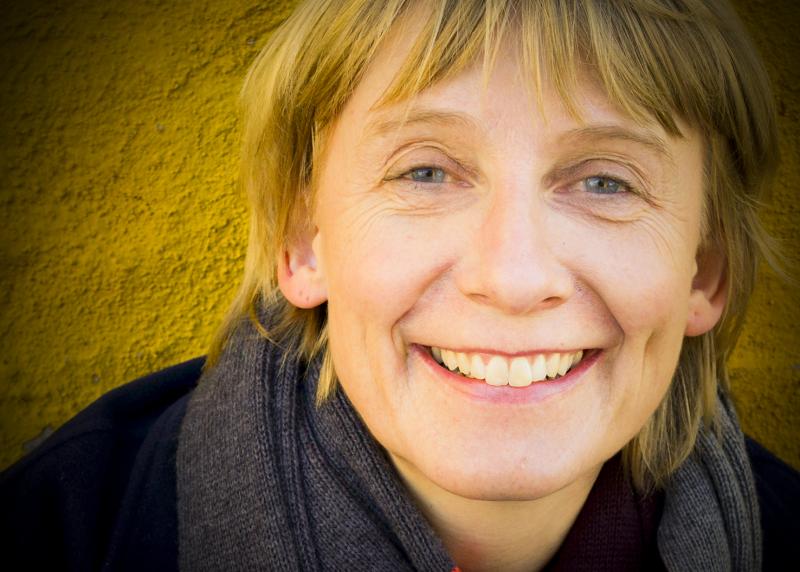"You know, I don't really feel that I have met much opposition. Lack of interest, perhaps, like "this is your field", but I think everyone experiences that. I have never had the feeling of being opposed."
When one meets someone like Ida Blom, a person who has produced revolutionary thoughts and cleared the way for a completely new field of research, one probably expects stories about wild conflicts, sabotage, lonely and hopeless battles and possibly some resentment.
But the Blom we meet at her home in the idyllic Søreide outside of Bergen, does not tell war-time stories, and she is neither resentful nor self-satisfied. Mild and amiable, she serves coffee and biscuits and looks out to the sea and her flourishing garden. Level-headed and grateful, she looks back on her career as an exciting and privileged journey into a new field.
"I have been incredibly lucky to have been a part of it. Everything was possible for us, everything had to be done. We had to find the sources and write the whole of women's history."
From Paris to Bergen
Ida Blom insists on wrapping herself in an energetic and enthusiastic "we" of women's history. This is of course too humble, as Blom is not just anyone. We are talking about the unquestionable "grand old lady" of Norwegian women’s and gender history. Behind her she has 130 books, book chapters and articles. And the work she has done has been highly appreciated. Most recently in March 2007, when Blom was appointed honorary member of the prestigious American Historical Association.
"Everything was possible for us, everything had to be done. We had to find the sources and write the whole of women's history."
That this would be the life of Ida Clara Bonnevie, was hardly something anyone imagined when she was born in Copenhagen in 1931. She herself had planned on becoming a trilingual correspondent. At the Copenhagen School of Business Administration Miss Bonnevie learned German, French and English. But she also met Christopher Blom from Bergen in Norway, who studied economics.. After some years in Europe, Christopher and his dear Ida, now Blom, went to the "capital" of Western Norway, 53 years ago.
"We weren't really going to live here. After two years in Paris, Bergen did not seem like a particularly exciting place, I'll admit. The only thing that spoke for this city was the nature and the small university, where I might have the possibility to continue my studies."
See also: History is still for men
History by coincidence
In Bergen, Blom continues with her studies. She completes courses in German and French. She then chooses to study history, mostly as a way of filling her degree. But it would show itself as a lucky, accidental choice.
"The history discipline fascinated me from the beginning. I, who was a little reserved with regards to aesthetics and lyrics and such within the language disciplines, found my place with the logic reasoning in history. And it was exciting to learn and understand new things about the country I had settled into, says Blom in a Bergen dialect with a strong trace of Danish."
And thus, Blom starts on a Master's degree in history. The topic is the Danish–Norwegian conflict regarding East Greenland between World War I and World War II. She gets part-time substitute positions at the Department of History, and after a few years she takes a sabbatical. In 1972, at the age of 41, Blom hands in her doctoral thesis, which is also on Greenland. Ironically, not a single woman is mentioned in the thesis of the up-and-coming herald of Norwegian women's history.
"I didn't think about it at all, says Blom and laughs heartily. – Not until afterwards."
Revolution
Within a few months, however, a sudden gender consciousness strikes her. The year is 1972 and the battle of whether Norway should join the European Economic Community is at its most intense.
"I heard some Labour Party women say that only men decided in the EEC. It struck me that French women had lacked the right to vote up until a few years before I moved to France. And that I had written in an article, which was about to be published, that Norway achieved universal suffrage in 1898. At the very last moment I had to correct it and add 'for men'," says Blom with a laugh.
Once the thought had occured, Ida Blom could see women and gender perspectives everywhere.
Once the thought had occured, Ida Blom could see women and gender perspectives everywhere.
"A revolution occurred in my understanding. I had taught history for ten years without considering that women had lived in this country, and had a history and something to say. I thought that this had to be something very exciting to uncover."
"Are you not a little surprised that the absence of women had not struck you before?"
"At that time history mainly concerned politics and there were no women in politics. At least, that's what we thought. When we first started looking, we discovered that there actually were some."
Women's front and local politics
The academic awareness was concurrent with a private and political process. The 1970s feminism ravaged the country and many of Blom's friends and acquaintances had joined the new women's movement. The neighbour’s daughters invited Blom into their women's group.
"I had not experienced many restrictions as a woman in my own life. I had been able to study and fulfil my desires and I had a husband who understood and supported me. Not even becoming a mother of twins had hindered me, as we could use my part-time income for au-pair girls. Things had worked out for me without struggle. It was in talks with other women that it became obvious to me how many obstacles there were for women," says Blom.
To revolutionize the history discipline
She joins the Women's Front (a Norwegian feminist organization), but later withdraws because she thinks the organization is too centralized and conflict-oriented. She also manages a short career within local politics, before she decides to concentrate on what she likes the most: the history discipline. And there is plenty to focus on for a newly converted feminist.
"Many colleagues probably thought our project was stillborn. "You won't find any sources on this" was something they told me when I, for example, wanted to study family planning in Norway in the early 19th century. But they were wrong, there were lots of sources. We never ran out of fascinating topics we could take on, and the field attracted lots of students. We wrote about girls' school experiences, women's organizations, women's political history, women's occupations and so forth. Everything was a potential research project," says Blom, who also has a broad array of topics in her own projects.
"One topic would lead to another. I discovered the significance of tuberculosis when I studied the role of the Norwegian Women's Public Health Association in the dissolution of the Swedish-Norwegian union. When I read about girls who were involved with German soldiers during the occupation of Norway in World War II, I noticed how the contagion-containment politics differentiated between women and men. The topics have found me rather than me finding them."
"What do you yourself think is your most important contribution?"
"To point to the significance of gender. It has opened the history discipline to new and exciting perspectives and improved the discipline," says Blom firmly. And she maintains that she did not experience opposition to this outright revolutionary project.
"You have to keep in mind that the history discipline was going through a thorough change. It was not just women's historians who protested against the traditional political history hegemony. At about the same time other fields appeared, such as historical demography, everyday history and working life history. We actually fit in quite well with the spirit of the times."
Imperialist women
"At the same time, there were probably some who thought that we were a bit too imperialist. We always asked: What did this mean for women? For those who weren't interested, this was probably a little annoying," chuckles Blom.
Because as long as women's historians content themselves with their own ("weaving and porridge-making and such", as one colleague expressed it) no one feels threatened. It was when they launched gender as an analytical category in all historical research that the resistance made itself heard.
"We always asked: What did this mean for women?"
"There were some intense discussions. But it was worth it. Now there are few who doubt the relevance of gender in history."
Blom gathers inspiration to take on the struggles and further developments of the theories, from her extensive international cooperation.
"The American historian Joan Scott meant a lot to me in the beginning. She had been concerned with gender as a fundamental category of analysis in social relations and as an indicator of power relationships. Later, there have been many places to gather inspiration from, both in Europe and not the least through cooperation with historians from other corners of the world," declares Blom. And she admits that she can sometimes become impatient and exasperated, when she feels that the gender perspective is left out.
"Now I am reading a book on Norwegian immigration history. It's a fascinating work, but I am left wondering whether there really isn't any difference between women and men among the Sami and the Kven," she says rhetorically.
"When it comes to the relationship between ethnicity, nationality, and gender there is a lot left to be done," asserts Blom.
See also: Hidden stories about sex and gender in the new Norwegian Queer Archive
Ready for new challenges
Blom is known for having an open mind to new perspectives and theoretical views. Right now she is particularly concerned with masculinity research. When she and several colleagues released With a gender perspective on Norwegian history a couple of years ago, masculinity researcher Jørgen Lorentzen accused them of writing "gender perspective" when they meant "women's perspective".
"That criticism was justified. Maybe we have not sufficiently asked ourselves what it has meant to be a man throughout history. What kind of portrayals of masculinity do we find in the sagas, for example? And how has masculinity varied with social class. The middle class ideal with weak and submissive women may have dominated the historical sources, but nothing suggests that the farmer and fisher women were weaklings. What was it like to live as a man with those kinds of women? This is something we have to uncover!"
Stopping while on top
Professor emerita Ida Blom has no plans of throwing in the towel just yet. The program is currently packed, with research, conferences, and lectures. Soon she hopes to get the time to write a book on sexually transmitted diseases with a welfare state perspective.
"When it comes to the relationship between ethnicity, nationality, and gender there is a lot left to be done."
"Imagine having an occupation that one enjoys this much! My husband is just as busy with his work, so we enjoy ourselves in each of our fields. And I feel incredibly privileged to be able to putter about with my work these days, when I see how horribly stressful it is for my colleagues after the quality reform [major university reform act in Norway]. I am content with having dodged that change," says Blom, who has made sure that she will know when it is time to stop.
"I have good friends who have promised to speak up if I start muddling about so much that it is clear that it is time to quit. The key word is a pseudonym for an acquaintance who continued his lecturing long after he should have quit. So when someone says "Gabrielsen", I know what I have to do," says Blom and laughs.
See also: Portrait: An eye for the unseen
Born in Copenhagen in 1931. Professor emerita in History, University of Bergen. In March she was made honorary member of the prestigious American Historical Association, because of her work on women’s- and gender histories.


